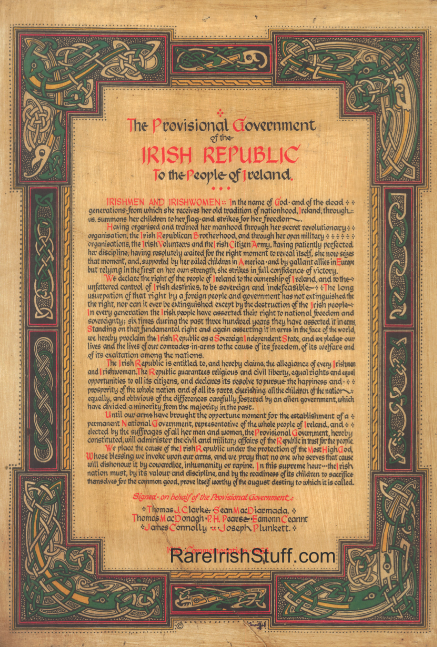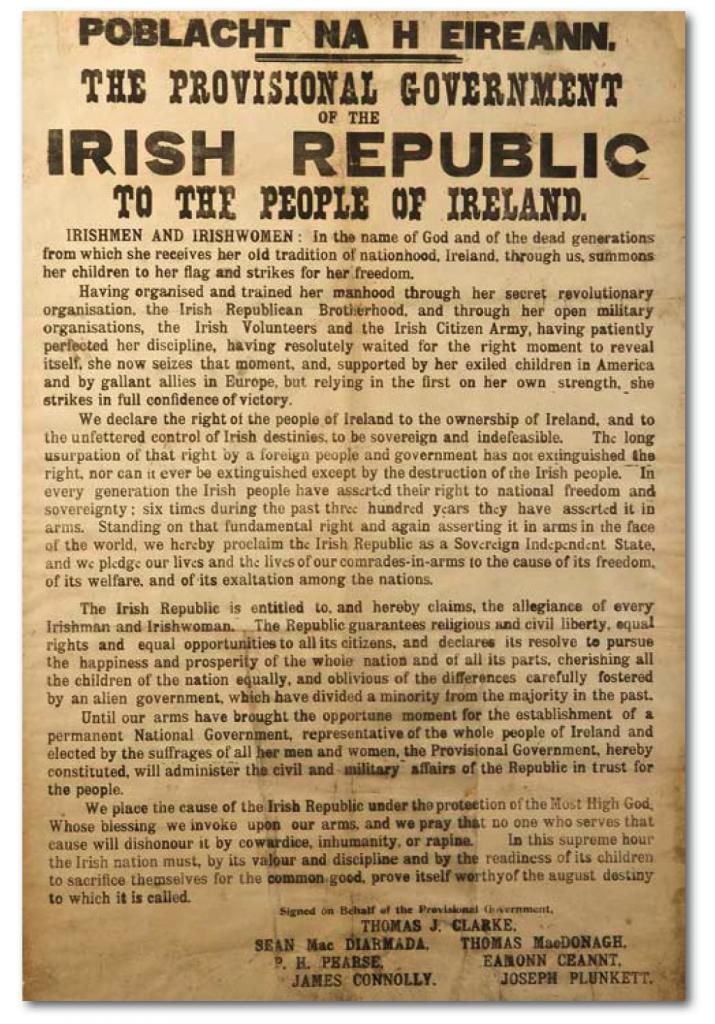 Re: Éirí Amach: Irish Rising (Ireland AAR) [updated: December 14, 2014]
Re: Éirí Amach: Irish Rising (Ireland AAR) [updated: December 14, 2014]
Thank you, IneptCmdr! I'm going to take your advice about using a 'no flags' mod. (I tried using p.jakub88's 'no floating flags' mod - it removed the flagpoles but not the big flags. I actually like this effect because it will be possible to take close-up pictures of soldiers without a big flagpole in the background - while, for long-distance shots, it will still be be possible to see which unit belongs to which side. My guess is that the AUM graphics pack, which mods flags, is causing the big flags to appear.)
Chapter Thirteen
The door began to open. Whoever was arriving would be walking into a dark room. Perhaps I could surprise them as they entered. I picked up my musket – it could still be used as a club, after all – and readied myself.
Then the door opened wide, and I all but dropped my musket in relief.
Callum Mackinnon stood in the doorway, holding a pistol surrounded by wisps of smoke. Next to him, there was a body on the floor. Callum said “I didn’t like the way he was creeping up to your door with a knife in his hand. It didn’t seem polite, so I thought I’d teach him what happens to people who do that.”
I started dumbly at Callum for a moment while he inspected the body. Callum said “He’s dead.”
I had to ask. “How did you know that someone was creeping up to my door? Did you just happen to be on your way here?”
“Colonel MacDónaill asked me and some of my Scottish lads to keep an eye on you. He said that you’re looking at some papers which belonged to the enemy and that the enemy might want them back.”
“I’m just an ordinary soldier. How would the enemy know that I had the Duke of Marlborough’s papers?”
Callum looked slightly shifty. “Well, you see, Colonel MacDónaill might have spread the word a little bit. The fact that the enemy knew about the ambush at Lisburn worried him a lot.”
I fell back into my chair, feeling as if I had been punched in the stomach. “You mean, MacDónaill deliberately spread the news that I had the Duke of Marlborough’s papers? I could have been killed.”
“Oh, no, you couldn't. I said, we've been watching you, day and night. You were so absorbed in studying your papers that you didn’t even notice us.” He sighed. “I'm afraid the colonel will not be pleased with me, though.” He prodded the dead spy with his boot. “He told me we should take any spies alive, if we could. But, when I saw this lad, he had his knife out and a dangerous look in his eyes. I couldn’t risk letting him get any closer to you.”
To restore my equilibrium, I joined Callum for a cup of ale in a quieter corner of the bar, where a group of soldiers were still loudly celebrating our victory at Lisburn. With all of the noise, I didn’t see any harm in telling Callum about the difficulty I had been having, trying to crack the code in the Duke of Marlborough’s papers. Callum handed me a piece of paper he had found in the pocket of the man who had tried to kill me. This piece of paper bore a list of verses in the Bible. The three verses at the top of the list were crossed out. “Could this list be a clue to the code which you’re trying to crack?” asked Callum. “How can a list of Bible verses help?” I asked. I explained how I had tried moving the letters in the papers in the alphabet, so that A would become B, B would become C, and so on – without any success. Callum explained, “The Mackinnons and other Jacobite rebels in Scotland use codes. First, we used the kind of cipher which you described – but the English army broke that easily. So we started using a cipher invented by an Italian, Giovan Battista Bellaso, more than a hundred years ago. Each letter moves a different number of places through the alphabet. You use a key phrase to tell you how many places each letter moves. These Bible verses could be the key phrases.”
“I see – and they use a different Bible verse to provide the key phrase for each month, or each week, maybe. That makes sense.”
In the relative quiet of my lodging room, Callum and I worked on the code. We tried the first Bible verse and the second, without success. I was almost ready to give up when we tried the third Bible verse and suddenly the message in one of the papers made sense. “At last!” I exclaimed.
We hurried at once, in great excitement, to report to Colonel MacDónaill, who invited Callum and me to attend a meeting of the senior officers the next day.
“Lieutenant Connolly, with the assistance of our friend from Scotland, has broken the code used by the enemy spies,” announced MacDónaill. The senior officers were shocked by the detailed information the spies had provided to the Duke of Marlborough. “So their general had detailed information about our numbers, our equipment, our training and our plans for the ambush at Lisburn,” observed one of the other colonels. “This must be the work of Irish traitors.”
“Aye,” said another officer. “And we thought we were being cautious when we made sure the only people given that kind of information were Irish-born. Seems we weren't cautious enough.”
MacDónaill asked whether the decoded messages contained clues about the identity of the traitors. “Their names aren’t here,” I explained “but we know where they are operating from. They are using a house in Dublin, which belongs to the British ambassador to Ireland, as the base for their spy network.” One of the officers suggested sending a company of cavalry to Dublin at once, to arrest the spies. “I agree that we should send soldiers to Dublin,” advised MacDónaill, “but they should keep watch on the house, not arrest the spies immediately. We should aim to capture as many of the spies as possible, not just those who happen to be in the house when our men get there.”
The general nodded. “I want all of them. Any we don't catch are a danger to our men.”
It was time for the senior officers to discuss the next move of Ireland’s army. I got up to leave the room, but MacDónaill told me to sit down. “Every colonel brings a junior officer to these meetings. Sometimes you can see things that we miss ... and, if the regiment’s commander is killed in battle, then at least one other officer should know the army’s plan.”
I expected the senior officers to discuss how we would defend ourselves against the next British army to land in Ireland. But, instead, they were talking about going on the offensive. As I listened to them talk, I realised the urgency of the situation. As the British navy had blockaded our ports, Ireland’s government would soon run out of money to pay the army. Meanwhile, the British government could raise troops faster than we could – and British ports were open, bringing huge wealth into their country.
It became clear that most of the senior officers wanted to land in Scotland, where we had friends, rather than in England. Callum Mackinnon, who had also been invited to stay, agreed, declaring proudly that the rebel Jacobite clans had already loosened the grip of the British government, and it would be no trouble for them to take over “if they had just one or two more men”. Since the British navy were running their blockade around the ports on Ireland’s south coast, fishing boats from Ireland and Scotland could carry our little army to the shores of Scotland. We would just have to hope that no British frigate arrived while we were at sea. On arriving in Scotland, our friends the Mackinnons would guide our army across the countryside to their destination.
The real problem, it emerged, was not the journey to Scotland. MacDónaill summed up the problem: “If we stay in Ireland, we have no chance against Britain. If we free Scotland, then we can win. To free Scotland we must take Edinburgh. To take Edinburgh, we must seize Edinburgh Castle. And as you know, we have no cannon to make a breach in the walls, so we must send our men to climb them.” He put a map of the castle on the table. “This attack will be very difficult without cannon. Edinburgh Castle is surrounded by steep cliffs on the southern, western and northern sides.”

“The eastern approach to the walls is, as you would expect, covered by plenty of the castle's own cannon. However, I believe Mr Mackinnon here may be able to help us.” He nodded at Callum Mackinnon, who explained that he could get men inside who would let down rope ladders, allowing our men to scale the cliffs and walls, and enter the castle. “There will still be hard fighting,” said Callum. “The British have sent Lord Berkeley's maritime regiment of foot to reinforce Edinburgh Castle. You saw at Lisburn how well the British marines fight.”
“Indeed we did,” replied Colonel MacDónaill. “But we must take Edinburgh to defeat the English. Besides, we fought pretty well at Lisburn ourselves.”
[The public domain image of Edinburgh Castle came from here. If you're curious about the code used in the Duke of Marlborough's papers, it was what is now called the Vigenère cipher, link (as that name for the cipher was introduced in the 19th century, I did not use it here.)]
Last edited by Alwyn; December 14, 2014 at 10:36 AM.












 Reply With Quote
Reply With Quote





































